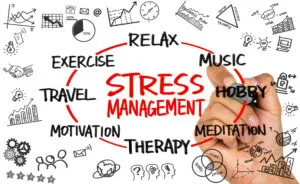Here are 7 Stress Management Techniques
Introduction: The 7 stress management techniques are aimed at preventing this from becoming a chronic problem. Stress is a common experience in modern life.
It can be caused by various factors such as work pressure, financial difficulties, relationship issues, and health problems. When stress becomes chronic, it can have a negative impact on both physical and mental health.
Therefore, it is important to manage stress effectively to prevent it from becoming a chronic problem. In this article, we will discuss some effective stress management techniques that can help you to cope with stress and lead a healthy and fulfilling life.
Effective Techniques
Identify the sources of stress
The first step in managing stress is to identify the sources of stress in your life. Some stressors are easy to identify, such as a job loss or a major illness, while others may be less obvious, such as ongoing conflicts with a friend or family member.
Take some time to reflect on your life and identify the situations, people, or events that trigger stress for you. Once you have identified the sources of stress, you can work on developing strategies to manage them.
Exercise regularly
Exercise is one of the most effective stress management techniques. Physical activity can help to release tension in the body, improve mood, and reduce stress hormones such as cortisol.
Exercise can also help to improve sleep quality, which is important for overall health and wellbeing. Aim for at least 30 minutes of moderate-intensity exercise on most days of the week.
Practice relaxation techniques

Relaxation techniques such as deep breathing, progressive muscle relaxation, and meditation can help to reduce stress and promote feelings of calm and relaxation.
These 7 Stress Management Techniques can be done anywhere and anytime, making them an easy and convenient way to manage stress.
Find a quiet place to sit or lie down, close your eyes, and focus on your breath or on relaxing each muscle group in your body.
Get enough sleep
Sleep is essential for physical and mental health. Lack of sleep can lead to increased stress levels, irritability, and poor concentration.
Make sure to get enough sleep each night to help manage stress. Aim for seven to nine hours of sleep each night and try to establish a regular sleep routine.
Eat a healthy diet
Eating a healthy and balanced diet can help to reduce stress levels. Avoid sugary and processed foods, which can lead to energy crashes and mood swings.
Instead, focus on whole foods such as fruits, vegetables, whole grains, lean proteins, and healthy fats. Eating a balanced diet can help to stabilize blood sugar levels, which can reduce stress and promote feelings of calm.
Connect with others
Social support is an important factor in managing stress. Talking to friends or family members about your feelings can help to reduce stress and promote feelings of connection and support. Joining a support group or seeking professional help can also be effective ways to manage stress.
Take breaks
Taking breaks throughout the day can help to reduce stress levels. Take a few minutes to step away from your work or other responsibilities and do something that you enjoy, such as reading a book or going for a walk. Taking breaks can help to reduce stress and promote feelings of relaxation and enjoyment.
Insights on 7 Stress Management Techniques
Prioritize self-care: In addition to the stress management techniques mentioned above, it’s important to prioritize self-care in your daily routine.
This includes taking time to do things you enjoy, setting boundaries, and saying no to things that don’t align with your values or priorities. Self-care can help to reduce stress and promote overall wellbeing.
Identify and challenge negative thoughts: Negative thoughts can contribute to stress and anxiety. Identify any negative thoughts you may be having and challenge them with evidence-based reasoning.
For example, if you’re worried about an upcoming presentation, remind yourself of times when you’ve given successful presentations in the past.
Use humor: Laughter is a powerful stress reliever. Find ways to incorporate humor into your daily routine, whether it’s watching a funny movie or spending time with friends who make you laugh.
Practice mindfulness: Mindfulness involves being present and fully engaged in the present moment. It can be practiced through meditation, yoga, or simply paying attention to your surroundings. Practicing mindfulness can help to reduce stress and promote feelings of calm and relaxation.
Seek professional help: If stress is significantly impacting your daily life, it may be helpful to seek professional help.
A mental health professional can provide support and guidance on effective stress management techniques, as well as address any underlying mental health conditions that may be contributing to stress.
Remember, stress is a normal part of life, but it’s important to manage it effectively to prevent it from becoming a chronic problem. By incorporating these insights into your daily routine, you can reduce stress and promote overall wellbeing.
Conclusion
Stress is a common experience in modern life, but it doesn’t have to be a chronic problem. By identifying the sources of stress in your life and practicing effective 7 stress management techniques such as exercise, relaxation, sleep, healthy eating, social support, and taking breaks, you can reduce stress and promote feelings of calm and relaxation.
Managing stress is an important part of maintaining physical and mental health, and can help you to lead a healthy and fulfilling life.
Anxiety and an Anxiety disorder
Anxiety and an Anxiety disorder

A graduate of Computer Science and Information Management Technology. Diploma – Caregiving, Certificates – Dementia and Diabetes Awareness and Management. A researcher, blogger, songwriter, singer and acoustic guitarist. Born in an environment where natural talents such as healing are imparted at our natural birth. This natural talents of healing is the result of our genetic inheritance and the training from family environment.




















